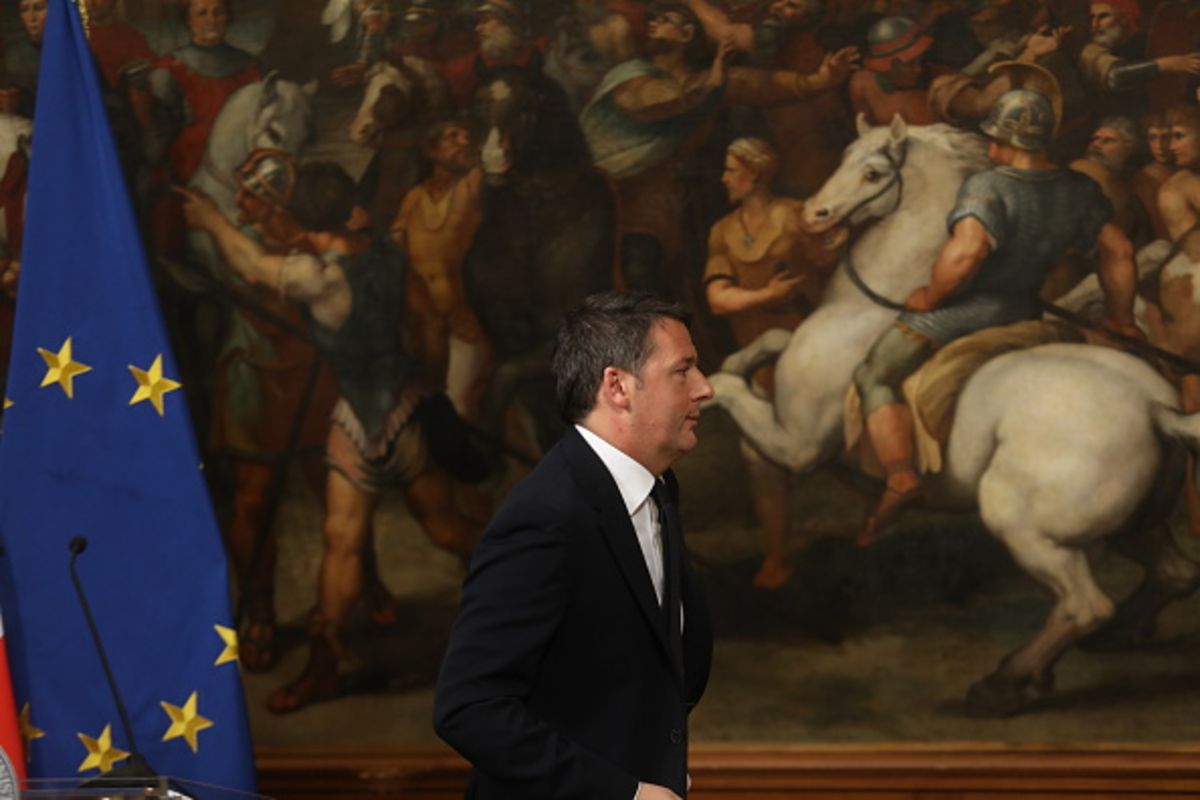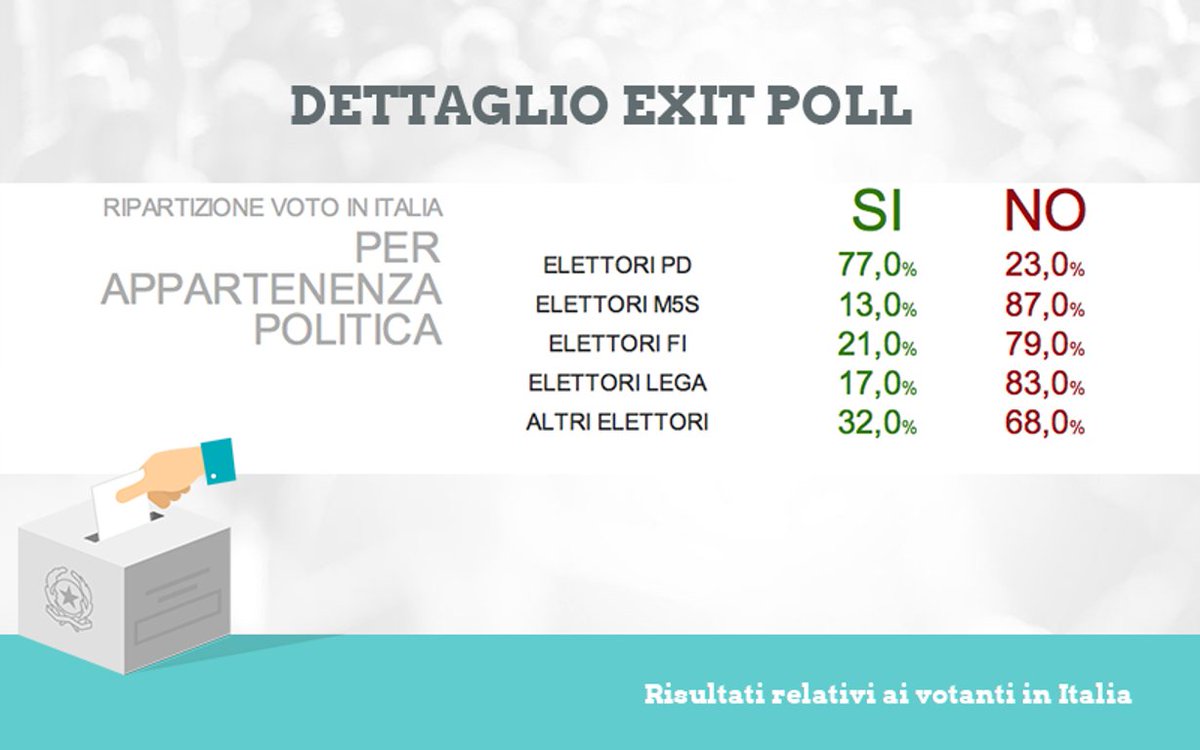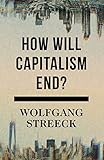
Matteo Renzi
(giving his resignation speech)
"Now that the referendum has failed, the next Italian government—which will have to draw support from Renzi’s Democratic Party to govern—will need to address five challenges in particular: a worsening sovereign debt problem, an unstable banking system, tangled public finances, immigration, and the disillusionment of the country’s youth." (Eric Jones FA)
THE AFTERMATH
As expected, the Italian Referendum on Constitutional change was defeated--
a good overview here. The NO vote (59%) was unexpectedly large.
In today's lecture, I want to;
(i) Examine the vote;
(ii) Explore the implications for Italy;
(iii) Speculate on the longer-range implications for Europe.
(iv) Provide my two-cents and explain why I think the negatives of this vote outweigh the positives of the Austrian election, which saw the defeat of the right-wing candidate Norbert Hofer.
My predictions from last week of a substantial NO vote were pretty much spot on.
Market reaction has been more muted than I expected, but it is early days yet. Expect the Euro to sink and the bond spread to blow out as he market realizes what a mess Italy is now in.
CURRENCY MARKET
EUR/USD --
1.0776
 (i) The Vote:
(i) The Vote:
This is a case where the pre-election polls got it (nearly) right; they show that Renzi managed to go from 60% in favor of the reforms to 53% against by the end of Oct--a trend that continued, taking the vote to nearly 60% against:

The take away message from the exit polls is that the NO vote was driven by the young (according to exit polls, 80% of those between 18-24 voted NO), the unemployed, and people on a low wage.
This suggests people voted more on their (very negative) feelings about the current regime--and especially its failure to remedy (or persuade Germany to remedy) the enduring economic crisis--than about the merits of the constitutional changes.
See the interactive graph from
Il Sole 24 Ore here (in Italian but easy to follow).
The vote was also split along party lines. PD voters were overwhelmingly in favour of the referendum--FI, Lega and esp. M5S overwhelmingly against.

The geographical distribution of the vote shows that support for NO was pretty much ubiquitous. Only 12 provinces went YES (in Green) --many of them from Tuscany, Renzi's home region--the South went overwhelmingly for NO.

Despite the crushing defeat for Renzi, there is one promising sign for him.
The yes vote performed better in nearly all provinces (and 13% better over all) than did the Parti Democratico (the PD--center-left party) under the left-wing unionist Pierluigi Bersani. Indeed, the yes vote did not do much worse (only 0.7% worse) than Renzi's vote in 2014, when he was at the peak of his popularity. These results suggest that Renzi still remains more popular than the PD than under its old leadership--a leadership (in the form of Pierluigi Bersani, Massimo D'Alema, and Roberto Speranze) that is hoping to now takeover the PD.
Since Renzi owes his position as head of PD to an election, he will remain PD leader until he is toppled in a vote.
My friend Enzo Rossi (University of Amsterdam) has a useful explanation of the voting blocs behind the YES and No camps:
"The international press is obsessed with populism these days, but the Italian NO was not just a victory of populists. Part of the anti-Renzi vote was anti-populist, in two senses: the old left sees Renzi as too populist, and the proposed reform was seen as dangerous in case of future victories of populist parties. Roughly, I think there were five voting drives:
A. People voting on the merits (not sure about the split).
B. Old left and respectable bourgeoisie rebelling against Renzi's juvenile vulgarity (and/or protecting their baby boomer privileges).
C. Populist left wanting to get rid of a neoliberal prime minister.
D. Xenophobic-conspiratorial-europhobic populists (M5S, Lega).
E. People believing in Renzi's renewal impulse and/or frightened of the economic consequences of a NO vote.
Part of A and E just weren't enough to win. Until not long ago B wasn't such a problem for Renzi, but the moment that the old middle class opinion makers start beating their drums the baby boomers come flocking and do the 'respectable' thing. They've got their good 'pay as you go' pensions anyhow, paid by the precarious workers of my generation. Until the banks hold, that is."
On this view, B, C, and D carried the day for the No camp.
Personally, I can understand (while not sharing) the motivations of the C and D camp. But I don't understand the B camp, who surely have the most to lose from Italy losing foreign confidence, which is now a genuine worry.
(ii) Implications for Italy:

Padoan--Matterella--Amato
Prodi-Grasso-Franceschini
Immediately after the Referendum results,
Matteo Renzi--as expected--resigned. The ball is now in the Court of President Matterella (a parliamentary appointed position) to select the next PM to form a government that can command enough support to pass a vote of confidence.
Some of the figures in play are the now elderly former PMs, like Guilio Amato and Romano Prodi (for crying out loud). The most likely candidate is Pier Carlo Padoan, a technocrat and current finance minister.
No less important than the PM choice is what happens to the political parties, especially the PD and the remnants of Berlusconi's party (currently split between NCD--"New Center Right"--and "Forza Italia"--Berlusconi's current party).
Before talking about the PD and NCD/FI, it is worth noting that both M5S and the Lega Nord (the racist, xenophobic Northern League party of Matteo Salvini) have proclaimed the NO victory as "their victory"--both are calling for a new election.There is a certain cynicism in the M5S position. they are calling for an election under the current ITALICUM (the electoral system that gives a seat bump to the Majority Party), despite long berating the unfairness of this system. Now that they are presumptively the largest Party, they want to take advantage of this bump option.
The point of departure for thinking about any government is the voting blocs behind the formation of Renzi's Government in 2014.
25 February 2014
Investiture vote for Renzi Cabinet
|
| House of Parliament | Vote | Parties | Votes |
| Senate of the Republic |  Yes Yes | PD (109), NCD (32), PSI-SVP (13), PI (10), SC (7), Others (5) |
|
 No No | FI (59), M5S (40), LN (15), GAL (9), SEL (7), Others (14) |
|
| Chamber of Deputies |  Yes Yes | PD (298), NCD (27), SC (27), PI (16), Others (20) |
|
 No No | M5S (104), FI (70), SEL (25), LN (19), FdI (9), Others (15) |
|
PD (298)--Demoratic Party (the Center-Left party)
M5S (104)--Grillo's Party
FI (70)--Forza Italia--Berlusconi's Party
NCD (27) --New Center Right (a center-right party of ex-Berlusconi supporters)
What will happen within the PD?
What will happen within NCD/FI? (Will Berlusconi return?)
(iii) Implications for Europe
The German reaction is worth noting:
Referendum in Italien
Renzis Gegner interessieren sich nicht für Italiens Zukunft
Der italienische Ministerpräsident Renzi ist mit seinem wichtigsten Reformprojekt gescheitert. Jene, die sich nun als Sieger gerieren, haben selbst keinen Plan. Egal ob sie aus seiner Partei kommen oder Silvio Berlusconi heißen. Eine Analyse.
05.12.2016, von TOBIAS PILLER, ROM
.......
Doch in der römischen Politik der kommenden Tage geht es nicht mehr um die Substanz der Reformen, sondern nur um die Frage, wer mehr Vorteil daraus schlagen kann, wenn sofort oder später gewählt wird, oder wenn die Wahlgesetze nun geändert werden oder unverändert bleiben. Renzis Gegner stecken nach ihrem Sieg in dem Referendum schon wieder mitten in den alten Riten der kurzsichtigen römischen Politik.
My translation:
RENZI'S OPPONENTS ARE NOT INTERESTED IN ITALY'S FUTURE
Italian Prime Minister Renzi has failed with his most important reform project. Yet those who are now victorious have themselves no plan. That's true whether they come from Renzi's own party or from Silvio Berlusconi himself.
An analysis.
05.12.2016, by TOBIAS PILLER, ROME
....... However, Roman politics of the coming days is no longer about the substance of the reforms, but about the question of who can gain more advantage-- whether elected immediately or later, whether the electoral laws change now or remain unchanged. After their victory in the referendum, Renzi's opponents are once again stuck with the old rites of short-sighted Roman politics.
-----
The view that the referendum returns Italy to stasis--whether right or wrong--is enough to further damage the economy and discourage both foreign and domestic investors.







